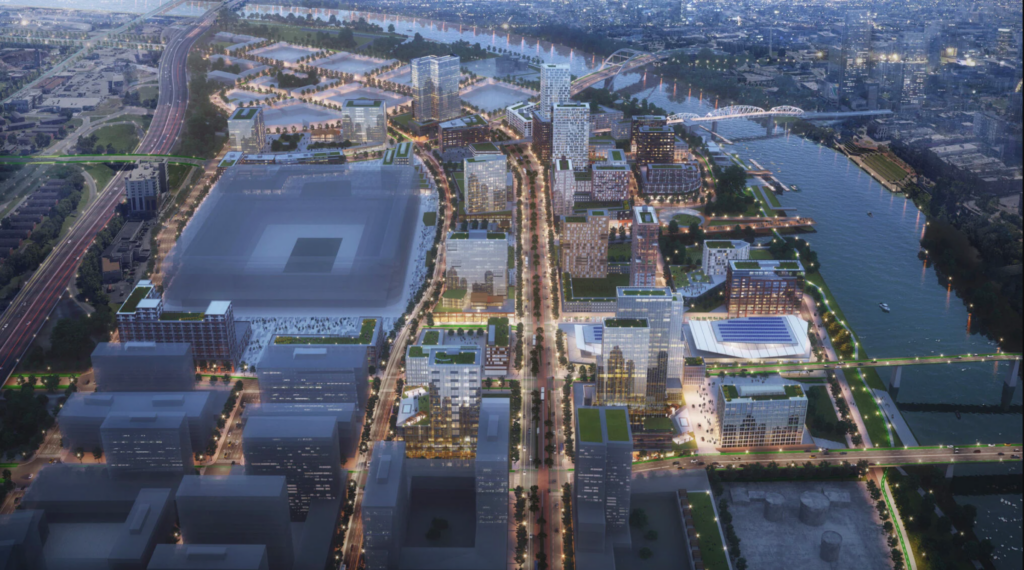
As it is now, the east bank of the Cumberland River in downtown Nashville consists of the soon-to-be-replaced Nissan Stadium, a sea of concrete and not much else. But, that’s not for long. Nashville’s Metro Council gave the city and Boston-based developer the Fallon Company the green light to develop the first 30 acres in the area.
In addition to granting approval for the 431-page agreement between Metro and Fallon, the council also approved a non-binding memorandum of understanding with the Tennessee Performing Arts Center, which plans to construct a new facility on the site.
What’s the scope?
The development deal covers only a portion of the Metro-owned land in the area — in total, Metro controls over 100 acres. Per the agreement, if Fallon meets their expected development milestones for the residential construction, they will be offered the option to develop another parcel.
Still, the first 30 acres will be a massive undertaking. Fallon intends to construct a “mixed-income neighborhood” of 1,550 residential units, 45% of which will be affordable. Fallon has a 99-year lease with the city, which requires that the designated units maintain affordability for the duration.
“We’re committed to having a range of affordability,” says Fallon’s president, Brian Awe. “Running the gamut from very-low-income subsidized, to more affordable housing, workforce housing, and spreading across all of the different buildings.”
Between the demands of the new $2.1 billion Titans stadium, the new TPAC facility, enhancements to the John Siegenthaler Pedestrian Bridge and other infrastructure changes, the estimated infrastructure costs total $147 million.
Fallon will incur nearly half of these — their $72.6 million will fund roadways and a part of the pedestrian bridge’s extension. TPAC’s share, $67.6 million, will support improvements to the pedestrian bridge and other infrastructure, while Metro’s $6.8 million will relocate a gas pipeline and fund the portion of the pedestrian bridge that will extend over the new East Bank Boulevard.
Potential disruptions?
Despite the scope of the project, Metro’s Chief Development Officer, Bob Mendes, says that construction shouldn’t cause much disturbance for Nashvillians.
“Right now, there are literally zero permanent residents on the East Bank,” Mendes says. “So, the good news is that we’re not going to disrupt anybody’s immediate neighborhood, because we’re really starting from a clean slate.”
Mendes says that surrounding roads like Korean Veterans Boulevard, Shelby Avenue and Woodland Street will remain open at all times without disruption, and that the only interruptions will likely be to those who use the area around the existing Titans stadium as a shortcut.
Community pushback
Throughout the course of negotiations, local Indigenous leaders have spoken out at Metro Council meetings and met with leaders like Mendes and Councilmember Jacob Kupin to ask for preservation of the land and its Indigenous history.
Through an effort led by the Indigenous Peoples Coalition, community members have proposed things like plaques, educational opportunities, a written land acknowledgement, acreage dedicated to an Indigenous park, and a conservation easement between Metro and Native organizations for five acres of Metro-owned land. They also proposed the formation of an advisory council composed of Indigenous members, non-native members and Metro officials.
Despite those efforts, Mendes says there will be no formation of an advisory council.
“There’s nothing to advise on right now,” Mendes says. “The whole point of doing the development agreement is to outsource the development to a private party — that’s the point of the public-private partnership.”
Currently, there is a requirement for Metro to conduct an archaeological study at the site. According to Mendes, there may be more room for preservation efforts on city parcels beyond the 30 acres.
“We’re committed to work with TPAC and Fallon to make sure that there’s an appropriate acknowledgment at some point in the development, but we haven’t committed to anything in particular at this time,” Mendes says.
What’s next?
Construction on the development won’t start right away. The new Titans stadium, which broke ground earlier this year, is expected to open in 2027. By that time, the city wants to be underway on at least two buildings and the new Tennessee Performing Arts Center.
Clarification: This story has been updated to include the Indigenous Peoples Coalition and clarify their requests, including asking Metro for an Indigenous park and a conservation easement.

